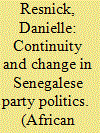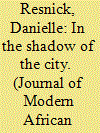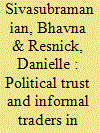| Srl | Item |
| 1 |
ID:
123506


|
|
|
|
|
| Publication |
2013.
|
| Summary/Abstract |
Senegal's 2012 presidential and legislative elections reaffirmed the country's longstanding reputation as one of Africa's most stable democracies. The elections also represented a critical juncture for the country's party system, demonstrated by the use of new campaign techniques as well as the gradual exit from the political scene of an older generation of elites. At the same time, this article argues, the elections revealed continuing weaknesses within the party system, including low levels of institutionalization and the limited ability of the opposition to mobilize key constituencies, such as underemployed urban youth. These trends are demonstrated through disaggregated election data that show a high degree of electoral volatility and party de-alignment as well as low levels of voter turnout. Thus, while Senegal has now achieved the two rounds of party turnover often deemed to be an important indicator of democratic consolidation, the elections also revealed that a vibrant, pluralistic party system can nonetheless fail to engage citizens over time.
|
|
|
|
|
|
|
|
|
|
|
|
|
|
|
|
| 2 |
ID:
102402


|
|
|
|
|
| Publication |
2011.
|
| Summary/Abstract |
Sub-Saharan Africa is the fastest urbanising region of the world. This demographic transformation has occurred in concert with two other trends in the region, nascent democratisation and stalled decentralisation. Using the case of Lusaka, Zambia, this study argues that in the context of multi-party competition and limited fiscal decentralisation, the challenges posed by rapid urbanisation are exacerbated for the urban poor living in cities controlled by opposition parties. Semi-structured interviews conducted with local political actors are combined with a survey of 200 informal sector workers in Lusaka. This data reveals the tactics employed by the central government to weaken the popularity of the opposition in Lusaka and shows that from the viewpoint of the urban poor, such tactics ultimately prove counterproductive. The presence of similar dynamics in other African cities has important implications for aid modalities, such as budget support, that are currently used by international donors to fund development projects, including those in the urban sector.
|
|
|
|
|
|
|
|
|
|
|
|
|
|
|
|
| 3 |
ID:
193275


|
|
|
|
|
| Summary/Abstract |
How do cities foster political trust among informal workers? This question is particularly salient in Africa's growing cities where local governments must reconcile policy priorities across highly heterogeneous constituencies, including a burgeoning middle-class and a large informal economy. We argue that expectations about reciprocity and procedural justice shape the probability that informal traders trust their local government. In doing so, we analyse a survey of approximately 1000 informal traders in Ghana's three main cities – Accra, Kumasi and Tamale. We find that traders who paid requisite fees to local assemblies and could attribute a benefit from those payments were more likely to trust their local government while those who had experienced harassment by city authorities were less likely to do so. The paper highlights that drivers of trust among diverse urban constituencies deserve greater empirical and comparative attention, especially as countries deepen decentralisation initiatives and cities commit to development goals around inclusivity.
|
|
|
|
|
|
|
|
|
|
|
|
|
|
|
|